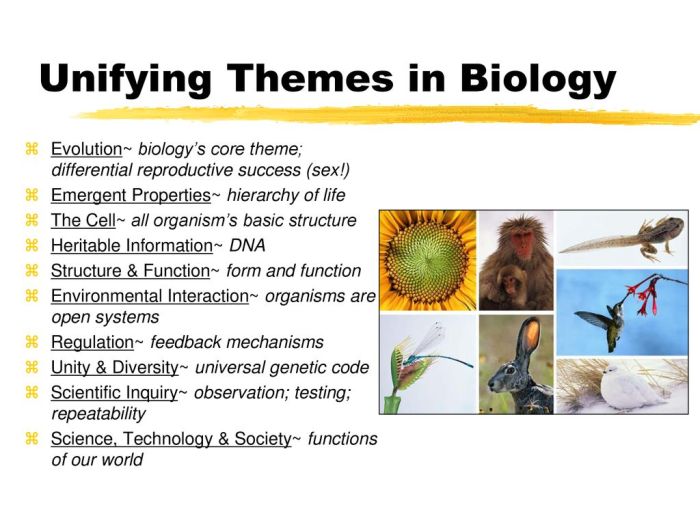Chapter 1 evolution the themes of biology and scientific inquiry – Chapter 1: Evolution, the Themes of Biology and Scientific Inquiry introduces a captivating exploration of the fundamental principles that underpin biological sciences. Through an engaging narrative, this chapter delves into the historical roots of biology and scientific inquiry, showcasing how these disciplines have shaped our understanding of the natural world.
The chapter elaborates on the core themes of biology, including evolution, genetics, and ecology, highlighting their interconnectedness and significance in unraveling the complexities of living organisms. It emphasizes the pivotal role of evolution as a unifying concept in biology, shaping the diversity and complexity of life on Earth.
The Historical Roots of Biology and Scientific Inquiry
Biology emerged as a scientific discipline through the contributions of early scientists and philosophers, such as Aristotle, Hippocrates, and Galen. These pioneers laid the foundation for scientific inquiry by observing and documenting the natural world, using methods like dissection and experimentation.
Over time, scientific inquiry has shaped our understanding of biology, from the discovery of cells by Robert Hooke to the development of evolutionary theory by Charles Darwin.
Contributions of Early Scientists
- Aristotle: Developed a comprehensive system of classification for living organisms and laid the groundwork for comparative anatomy.
- Hippocrates: Emphasized the importance of observation and experience in medicine, establishing the foundation for clinical medicine.
- Galen: Performed anatomical dissections and made significant contributions to the understanding of human physiology and anatomy.
The Role of Scientific Inquiry, Chapter 1 evolution the themes of biology and scientific inquiry
Scientific inquiry has played a pivotal role in advancing our understanding of the natural world. Through hypothesis testing, experimentation, and data analysis, scientists have made groundbreaking discoveries that have transformed our knowledge of biology. For instance, the discovery of the germ theory of disease by Louis Pasteur led to the development of vaccines and improved public health.
The Core Themes of Biology
Biology is underpinned by fundamental principles that unify the study of living organisms. These core themes include evolution, genetics, and ecology.
Evolution
Evolution is the central theme of biology, explaining the diversity and complexity of life on Earth. It describes the process by which species change over time through natural selection, leading to the emergence of new species and the adaptation of organisms to their environments.
Genetics
Genetics focuses on the inheritance of traits from parents to offspring. It involves the study of genes, chromosomes, and DNA, which determine the genetic makeup and characteristics of organisms.
Ecology
Ecology examines the interactions between organisms and their environments. It explores how organisms adapt to their surroundings, compete for resources, and form complex ecosystems.
Interconnections
These core themes are interconnected and contribute to our comprehensive understanding of living organisms. Evolution provides the framework for understanding the diversity of life, genetics explains the mechanisms of inheritance, and ecology investigates the interactions between organisms and their environments.
Evolution as a Unifying Concept in Biology
Evolution serves as a unifying concept in biology, connecting diverse fields of study and providing a comprehensive explanation for the diversity and complexity of life on Earth.
Significance
Evolution explains how species change over time through natural selection, leading to the emergence of new species and the adaptation of organisms to their environments. It provides a framework for understanding the unity and diversity of life, from the smallest microorganisms to the largest animals.
Applications
Evolutionary principles have been applied to various biological fields, including medicine, agriculture, and conservation. For example, evolutionary medicine investigates the role of natural selection in human health and disease, while evolutionary agriculture uses evolutionary principles to improve crop yields and livestock production.
Additionally, conservation biology applies evolutionary principles to preserve biodiversity and protect endangered species.
The Role of Scientific Inquiry in Advancing Biological Knowledge

Scientific inquiry is essential for expanding our understanding of biology. It involves formulating hypotheses, conducting experiments, and analyzing data to test and refine our knowledge.
Importance
Scientific inquiry allows us to gather empirical evidence, test hypotheses, and make informed conclusions about biological phenomena. It enables us to uncover the mechanisms underlying biological processes, identify patterns, and develop theories that explain the natural world.
Breakthroughs
Scientific inquiry has led to groundbreaking discoveries that have transformed our understanding of biology. For example, the discovery of the structure of DNA by Watson and Crick revolutionized our understanding of genetics, while the development of the polymerase chain reaction (PCR) technique has enabled us to amplify and study specific DNA sequences.
Challenges and Controversies in Biology: Chapter 1 Evolution The Themes Of Biology And Scientific Inquiry
Biology is a dynamic field with ongoing debates and controversies. These challenges contribute to the advancement of scientific knowledge and encourage critical thinking.
Origins of Life
One major debate in biology centers around the origins of life. Scientists continue to investigate how the first living organisms arose from non-living matter, exploring theories such as abiogenesis and panspermia.
Climate Change
Climate change is a significant environmental challenge that has become a major focus in biology. Scientists study the impact of climate change on ecosystems, biodiversity, and human health, seeking solutions to mitigate its effects.
Ethical Implications of Genetic Engineering
Genetic engineering raises ethical concerns regarding its potential impact on human health, the environment, and biodiversity. Scientists and ethicists engage in discussions about the responsible use of genetic technologies, considering issues such as genetic discrimination and the potential for unintended consequences.
Frequently Asked Questions
What is the significance of evolution as a unifying concept in biology?
Evolution serves as a central theme in biology, providing a framework for understanding the diversity, complexity, and interconnectedness of life on Earth. It explains the origin of species, the adaptation of organisms to their environments, and the driving forces behind the evolution of new traits and behaviors.
How does scientific inquiry contribute to the advancement of biological knowledge?
Scientific inquiry plays a crucial role in expanding our understanding of biology. Through hypothesis testing, experimentation, and data analysis, scientists gather evidence and develop theories that explain biological phenomena. This process leads to groundbreaking discoveries and advancements in fields such as medicine, agriculture, and conservation.
